

JB Salvage is a locally owned and operated scrap metal recycling company servicing residential, commercial and industrial customers for over 25 years at its current location in Bloomington, Indiana. JB Salvage purchases and recycles all types of ferrous and non-ferrous metal.
The scrap industry contributed $65 billion in 2006 and is one of the few contributing positively to the U.S. balance of trade, exporting $15.7 billion in scrap commodities in 2006. This imbalance of trade has resulted in rising scrap prices during 2007 and 2008 within the United States.[2] Scrap recycling also helps reduce greenhouse gas emissions and conserves energy and natural resources. For example, scrap recycling diverts 145,000,000 short tons (129,464,286 long tons; 131,541,787 t) of materials away from landfills. Recycled scrap is a raw material feedstock for 2 out of 3 pounds of steel made in the U.S., for 60% of the metals and alloys produced in the U.S.,ddd for more than 50% of the U.S. paper industry’s needs, and for 33% of U.S. aluminum. Recycled scrap helps keep air and water cleaner by removing potentially hazardous materials and keeping them out of landfills.
How scrap is processed
Scrap is often taken to a wrecking yard (also known as a scrapyard, junkyard, or breaker’s yard), where it is processed for later melting into new products. A wrecking yard, depending on its location, may allow customers to browse their lot and purchase items before they are sent to the smelters although many scrap yards that deal in large quantities of scrap usually do not, often selling entire units such as engines or machinery by weight with no regard to their functional status. Customers are typically required to supply all of their own tools and labor to extract parts, and some scrapyards may first require waiving liability for personal injury before entering. Many scrapyards also sell bulk metals (stainless steel, etc) by weight, often at prices substantially below the retail purchasing costs of similar pieces.
In a strict sense, recycling of a material would produce a fresh supply of the same material, for example used office paper to more office paper, or used foamed polystyrene to more polystyrene. However, this is often difficult or too expensive (compared with producing the same product from raw materials or other sources), so “recycling” of many products or materials involves their reuse in producing different materials (e.g., cardboard) instead. Another form of recycling is the salvage of certain materials from complex products, either due to their intrinsic value (e.g., lead from car batteries, or gold from computer components), or due to their hazardous nature (e.g., removal and reuse of mercury from various items).
Types of Scrap Metals
Scrap metal can be categorized into two types, viz. – ferrous and nonferrous. Scrap iron and steel are referred as ferrous scrap that include – scrap from old cars, steel beams, household appliances, railroad tracks, ships, and food packaging and other containers.
Nonferrous scrap metals include scrap metals other than steel and iron. Some common examples of non-ferrous scrap, include – aluminum (including foil and cans), copper, zinc, lead, nickel, cobalt, titanium, chromium, and precious metals. Although there is less nonferrous scrap than ferrous scrap, it is often financially more worthy. Millions of tonnes of nonferrous scrap metal is recycled by processors and consumed by secondary smelter, refiners, fabricators, ingot makers, foundries, and other industries.
Scrap metal, ferrous as well as nonferrous, can be categorized as either “home scrap” or “purchased scrap.”
| Company Name | JB |
| Business Category | Scrap Metal Recycling |
| Address | 1803 West Vernal Pike Bloomington Indiana United States ZIP: 47404 |
| President | NA |
| Year Established | NA |
| Employees | NA |
| Memberships | NA |
| Hours of Operation | MONDAY-FRIDAY 8a-5p SATURDAY 8a-12p SUNDAY CLOSED |
| Phone Number | Locked content | Subscribe to view |
| Fax Number | Locked content | |
| Locked content | ||
| Website | Locked content |